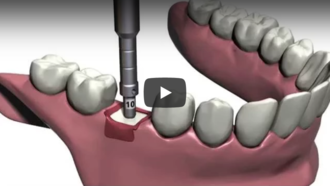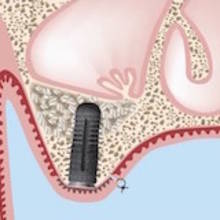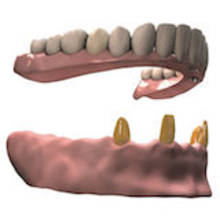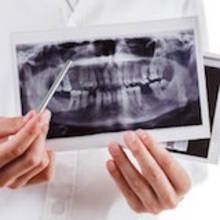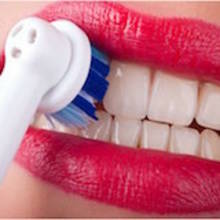Wie funktioniert ein Knochenaufbau für Implantate und was kostet er?
Rauchen und Implantate: grosses Risiko für den Implantaterfolg?
Der negative Einfluss des Rauchens auf Zahnimplantate ist durch zahlreiche Studien eindeutig belegt. Rauchen sorgt für
- mehr Komplikationen nach Implantationen und bei einem Knochenaufbau
- stärkeren Knochenverlust bei Rauchen und Implantate
- höhere Implantat-Verlustrate durch nicht stattfindende Einheilung (Störung der Osseointegration)
- höhere Verlustrate auf lange Sicht (schlechtere Prognose)
Wen wundert’s? Für viele Implantologen ist das Rauchen eine Kontraindikation für Implantate.

Implantat-Risiko steigt mit der Zahl der Zigaretten, die Sie rauchen
Mit der Zahl der gerauchten Zigaretten steigt auch das Risiko für Komplikationen und Misserfolg. Schon ab 10 Zigaretten ist das Problem messbar, danach steigt die Gefahr für einen schlechten Verlauf weiter an.
Der Mechanismus ist vielschichtig. Neben dem Nikotin sind im Rauch auch andere Gifte enthalten: Kohlenmonoxid, Blausäure, Acetaldehyd, Acrolein usw. wirken als Zellgifte negativ auf Knochenstoffwechsel und -heilprozesse ein. Schlechtere Blutversorgung des Knochens inklusive geringere Verknöcherungsrate wurden dokumentiert.
Unsere Genetik ist mitentscheidend
Auch unser Körper spielt eine wichtige Rolle. So wurde bei Rauchern mit einem positiver IL-1-Genotyp ein stark gesteigertes Risiko für Implantatkomplikationen entdeckt. So dürfte es für jeden Raucher einen eigenen Schwellenwert geben, ab wann die Gesundheit kippt.
E-Zigaretten wohl weniger riskant für Zahnimplantate
Laut einer Studie des Bundesinstituts für Risikobewertung (BfR) werden durch E-Zigaretten (Erhitzung des Inhalativs auf 250-300 Grad) weniger gesundheitsschädlicher Substanzen. Im Vergleich zur normalen Zigarette freigesetzt. Formaldehyd, Acetaldehyd, Acrolein oder Crotonaledehyd werden um 80 bis 96% reduziert. Benzol und anderen flüchtige Verbindungen sogar um bis zu 99%. Die Rauchtemperatur in der Mundhöhle ist ebenfalls deutlich niedriger und ist somit auch weniger schädlich für das Zahnfleisch. Da der Nikotingehalt im E-Zigarettenrauch nicht geringer ist, bleibt der negative Einfluss des Nikotins z.B. auf die Knochendurchblutung gleich. Das Risiko für Misserfolge dürfte damit auch bei E-Zigarettenrauchern etwas höher sein. Eine sichere Datenlage gibt es aber noch nicht.
Sind Implantate bei mir als Raucher möglich oder sinnvoll?
Obwohl das Komplikationsrisiko steigt, sind die Erfolgszahlen für Implantate bei Rauchern nicht schlecht. Rauchen ist also keine absolute Kontraindikation für Implantate. Bei starken Rauchern in Kombination mit anderen Risikofaktoren (z.B. positiven IL-1-Genotyp, Parodontitis, schlechter Mundhygiene etc.) ist es aber notwendig alle Möglichkeiten auszuschöpfen, um das Misserfolgsrisiko zu minimieren.
Ein erfahrener Implantologe wird Sie unterstützend begleiten und nicht wegschicken.
Was kann ich als Raucher für den Implantaterfolg tun?
An erster Stelle sollte hier natürlich stehen: mit dem Rauchen aufhören. Darauf sidn Sie sicher auch selber gekommen. Unser Maßnahmenkatalog umfasst daher machbare Ansätze für Raucher, die eine Verbesserung belegen konnten:
- weniger Rauchen vor und in den Wochen nach der OP
- umsteigen auf E-Zigarette: nicht perfekt aber schon hilfreich
- Parodontitis vorab sicher sanieren und Mundhygiene optimieren (Kombinationsrisiko senken)
- auf jeden Fall Antibiotikaprophylaxe bei der OP
- Knochenaufbau vermeiden (z.B. kurze/dünne Implantate)
IMPLANTAT-SPEZIALISTEN IN IHRER NÄHE
Abt E , Smoking increases dental implant failures and complication, Evid Based Dent. 2009;10(3):79-80.
Aglietta M, Siciliano VI, Rasperini G, Cafiero C, Lang NP, Salvi GE, A 10-year retrospective analysis of marginal bone-level changes around implants in periodontally healthy and periodontally compromised tobacco smokers, Clin Oral Implants Res. 2011 Jan;22(1):47-53. doi: 10.1111/j.1600-0501.2010.01977.x. Epub 2010 Sep 10.
Anner R, Grossmann Y, Anner Y, Levin L , Smoking, diabetes mellitus, periodontitis, and supportive periodontal treatment as factors associated with dental implant survival: a long-term retrospective evaluation of patients followed for up to 10 years Implant Dent. 2010 Feb;19(1):57-64
Baig MR, Rajan M, Effects of smoking on the outcome of implant treatment: a literature review, Indian J Dent Res. 2007 Oct-Dec;18(4):190-5.
Carcuac O, Jansson L , Peri-implantitis in a specialist clinic of periodontology. Clinical features and risk indicators. Swed Dent J. 2010;34(2):53-61
Cavalcanti R, Oreglia F, Manfredonia MF, Gianserra R, Esposito M, The influence of smoking on the survival of dental implants: a 5-year pragmatic multicentre retrospective cohort study of 1727 patients. Eur J Oral Implantol. 2011 Spring;4(1):39-45.
Cochran DL, Schou S, Heitz-Mayfield LJ, Bornstein MM, Salvi GE, Martin WC, Consensus statements and recommended clinical procedures regarding risk factors in implant therapy. Int J Oral Maxillofac Implants. 2009;24 Suppl:86-9.
De Bruyn H, Collaert B, The effect of smoking on early implant failure. Clin Orals Impl Res 1994: 5: 260-64
Epidemiologischem Suchtsurvey 2018
García-Bellosta S, Bravo M, Subirá C, Echeverría JJ, Retrospective study of the long-term survival of 980 implants placed in a periodontal practice. Int J Oral Maxillofac Implants. 2010 May-Jun;25(3):613-9.
Gruica B, Wang H-W, Lang NP and Buser D, Impact of IL-1 genotype and smoking status on the prognosis of osseointegrated implants. Clinical Oral Implants Research Volume 15 Issue 4, Pages 393 – 400
Haas R, Haimböck W, Mailath G, Watzek G, The relationship of smoking on peri-implant tissue: A retrospective study. J Prosth Dent 2009, 76:6, 592-596
Habsha, Effrat B.Sc., D.D.S., Survival of Osseointegrated Dental Implants in Smokers and Non-Smokers, , A thesis submitted in conformity with the requirements for the degree of Master of Science Graduate Department of Dentistry; University of Toronto, 2000
Heitz-Mayfield LJ, Huynh-Ba G., History of treated periodontitis and smoking as risks for implant therapy, Int J Oral Maxillofac Implants. 2009;24 Suppl:39-68.
Hinode D, Tanabe S-i, Yokoyama M, Fujisawa K, Yamauchi E, Miyamoto Y. Influence of smoking on osseointegrated implant failure: a meta-analysis, Clin. Oral Impl. Res. 17, 2006; 473-478+
João B. César-Neto, A Comparative Study on the Effect of Nicotine Administration and Cigarette Smoke Inhalation on Bone Healing Around Titanium Implants. Journal of Periodontology October 2003, Vol. 74, No. 10, Pages 1454-1459
Jones JK, Triplett RG, The relationship of cigarette smoking to impaired intraoral wound healing: a review, J Oral Maxillofac Surg 50:237-239,1992
Lambert PM, The Influence of Smoking on 3-Year Clinical Success of Osseointegrated Dental Implants, Annals of Periodontology December 2000, Vol. 5, No. 1, Pages 79-89
Levin L, Hertzberg R, Har-Nes S, Schwartz-Arad D, Long-term marginal bone loss around single dental implants affected by current and past smoking habits, Implant Dent. 2008 Dec;17(4):422-9
Levin, L, Schwartz-Arad, D, The Effect of Cigarette Smoking on Dental Implants and Related Surgery, Implant Dent 2005, 14:4; 357-363
Lindquist LW, Carlsson GE and Jemt T, Association between Marginal Bone Loss around Osseointegrated Mandibular Implants and Smoking Habits: A 10-year Follow-up Study, J DENT RES 1997; 76; 1667
Moy PK, Medina D, Shetty V, Aghaloo TL., Dental implant failure rates and associated risk factors, Int J Oral Maxillofac Implants. 2005 Jul-Aug;20(4):569-77
Oates TW, Caraway D, Jones J , Relation Between Smoking and Biomarkers of Bone Resorption Associated With Dental Endosseous Implants, Implant Dentistry Vol. 13/4, 352-357,2004
Pieper E, et al: Bundesgesundheitsbl 2018;61:1422-1428
Roos-Jansåker AM , Long time follow up of implant therapy and treatment of peri-implantitis. Swed Dent J Suppl. 2007;(188):7-66
Roos-Jansåker AM, Renvert H, Lindahl C, Renvert S. , Nine- to fourteen-year follow-up of implant treatment. Part III: factors associated with peri-implant lesions., J Clin Periodontol. 2006 Apr;33(4):296-301
Schwartz-Arad, D, Smoking and Complications of Endosseous Dental Implants, J Periodontol 2002;73:153-157
Souza JG, Bianchini M, Ferreira C, Relationship between smoking and bleeding on probing, J Oral Implantol. 2010 Aug 6
Tomar SL, Cigarette smoking does not increase the risk for early failure of dental implants, J Evid Based Dent Pract. 2009 Mar;9(1):11-2.
Tonetti MS, Cigarette smoking and periodontal diseases: etiology and management of disease, Ann Periodontol. 1998 Jul;3(1):88-101.
W-Dahl A, Toksvig-Larsen S., Cigarette smoking delays bone healing: a prospective study of 200 patients operated on by the hemicallotasis technique, Acta Orthop Scand. 2004 Jun;75(3):347-51
Wood MR, DMD and Vermilyea, SG, DMD, MS, A review of selected dental literature on evidence-based treatment planning for dental implants: Report of the Committee on Research in Fixed Prosthodontics of the Academy of Fixed Prosthodontics, J Prosth Dent 2004, 92:5, 447-462
Twito D, Sade P.The effect of cigarette smoking habits on the outcome of dental implant treatment. PeerJ. 2014 Sep 2;2:e546. doi: 10.7717/peerj.546. eCollection 2014.
Chrcanovic BR1, Albrektsson T2, Wennerberg, Smoking and dental implants: a systematic review and meta-analysis, J Dent. 2015 Mar 13. pii: S0300-5712(15)00060-3. doi: 10.1016/j.jdent.2015.03.003.


